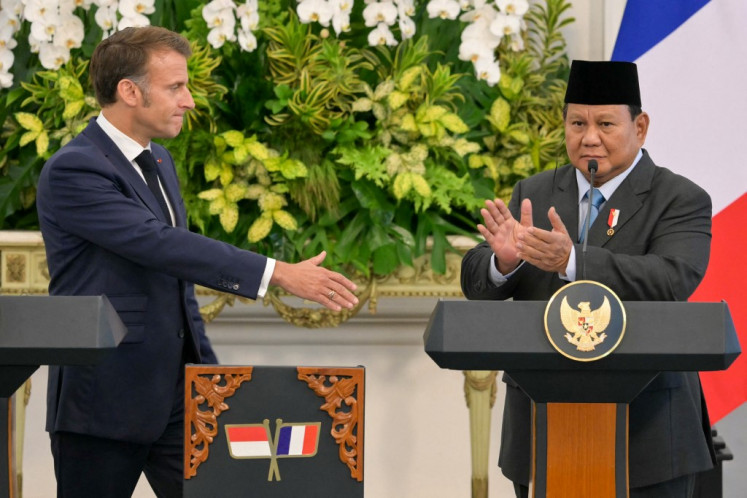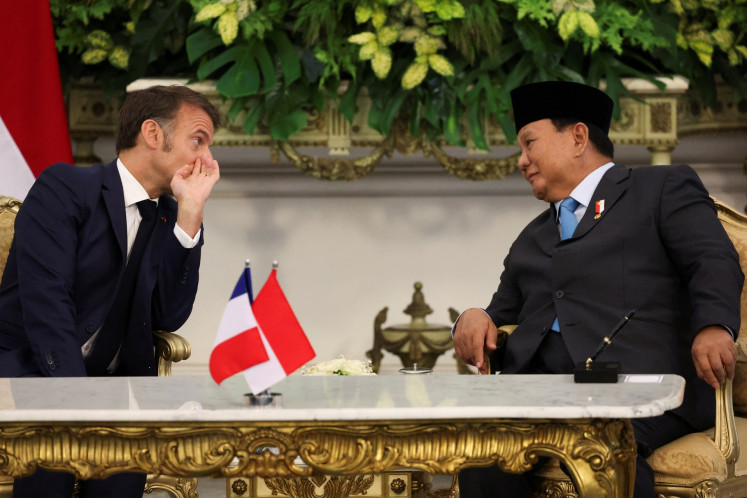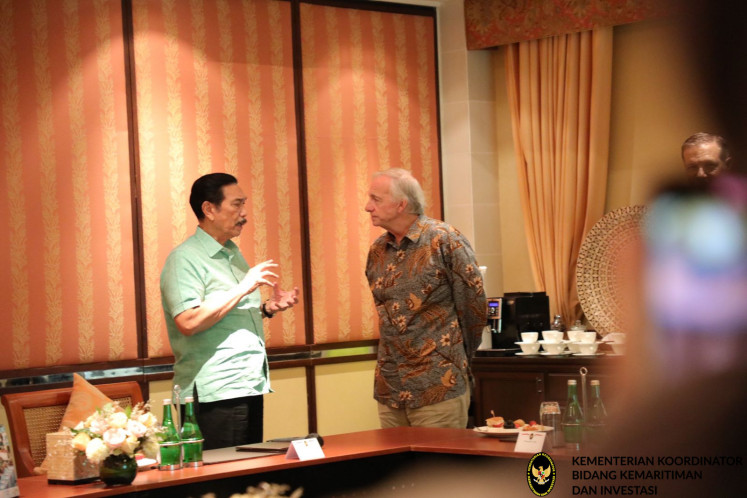Social innovation for energy transition
Energy and Mineral Resources Minister Ignasius Jonan recently said Indonesia may not be able to achieve its goal to increase the share of new and renewable sources of energy to 23 percent in the country’s energy mix by 2025
Change text size
Gift Premium Articles
to Anyone

E
nergy and Mineral Resources Minister Ignasius Jonan recently said Indonesia may not be able to achieve its goal to increase the share of new and renewable sources of energy to 23 percent in the country’s energy mix by 2025.
Indonesia has issued more than enough policies to attract investors to develop new and renewable energy. However, the response is slow as traditional fuels are still relatively cheaper.
He also argued that despite the price getting lower and that the technology is available, the development of renewable energy would still take time. Then what can we do to contribute to the acceleration of the renewable energy transition?
Beside economic issues, societal acceptance topic is also important in the renewable energy transition. The energy transition includes macro-level innovations that often consist of a series of technological advancements. This is usually followed by changes in societies, their economic and social domains. Therefore, it requires social innovation.
Social innovation is various ways where people are finding new and more effective solutions and answers to actual problems. Social innovation acknowledges community participation. High levels of participation reflect a community’s acceptance towards social innovation that includes a business element. New business models on social innovation can result in profits in the form of livelihoods for local communities.
A collaboration of civil society and business actors with government agencies can help provide incentives for social innovation. The incentives address the economic issue.
It also stimulates change in citizen behavior, which implies that social innovation needs to be inserted into an economic structure of interdependencies between multiple actors. Therefore, citizens have a key role within the renewable-energy transition, especially in cities that are a good target for social innovation because it has well-educated citizens who could see the use of fossil fuels as a problem.
Social innovation can function as a tool to analyze changes in social relations resulting from recent technological innovations. The technological innovation does not only affect the energy production and consumption cycles, but also the (in)direct effects on consumers and the environment. Social innovation involves all sectors of society, i.e. (combinations of) public, private and civil society actors. Social practices and the policies are essential to determine how sociotechnical transitions play out.
Examples of policies that shape social practices are subsidies on solar panels and sustainable housing policies. These social practices’ policies need to be promoted within the energy transition.
Urban clean-energy transitions are not the result of a change in the technical processes of energy consumption, distribution and production. But, that it largely depends on the combination of “how infrastructures, buildings, industries, institutions, as well as individuals and social groups, their practices and values both shape and are shaped by context-specific, conflicting energy needs, uses, forms of management” work together.
Consumers are not isolated but inserted into an economic structure of interdependencies between multiple related actors. This context stimulates systemic change that surrounds consumers.
A renewable-energy transition in cities requires a systemic change. Empowering social innovation is one of the drivers of systemic change in cities. Urban grassroots niches such as citizen energy initiatives can be established as a social innovation to utilize existing energy subsidies.
So, cities have the ability to create new energy markets and to function as hubs for social innovation. Government and private interest groups have an opportunity to provide incentives for citizen energy initiatives.
Several examples of social innovation are prosumer initiatives and energy cooperatives. A prosumer is a citizen as an energy consumer who also produces energy, e.g. solar panels on one’s roof.
One such prosumer initiative is the Smart Grid project that facilitates bi-directional energy and information flow between the utility grid and the energy consumer. It not only allows the consumer to generate energy, but to also share it with other energy consumers throughout the grid.
This kind of initiative is often associated with the idea of energy cooperatives that can manage microhydro power to foster the development of local energy communities. Multiple actors engage with the institutionalization and establishment of social innovations that support the development of decentralized energy systems.
By producing and consuming their own energy, citizen can become active market players. Thus, by letting citizens get acquainted with this role — multiple actors have to stimulate the development from a passive to a pro-active consumer. In principle, when a citizen is closely engaged with energy production, they will have a higher awareness of renewable energy sources.
The energy transition goes hand-in-hand with social, economic and political shifts. Social innovations are interlinked with other drivers for the socioenergy systemic change and it means that the systemic change also works as drivers to support social innovation.
Another driver looks at “transforming urban metabolisms and political ecologies.” The citizens can make coalitions with local governments and other actors to test new technologies and services to reduce the city’s greenhouse gas emissions, maintain today’s living standards and sustain economic growth. It gives legitimacy, openness and accountability of the multi-level governance process.
Then, “configuring green economies” could also be a driver for urban innovation systems. It pays particular attention to transformations of the production and consumption cycles of energy. This implies a focus on businesses and consumers, and their place-dependent networks, strategies and requirements for creating a green business.
Knowledge transfers and (social) innovations are facilitated through cooperation, e.g. by networks of actors with shared values. It provides an opportunity to increase wider citizen participation in social innovation.
______________________________
The writer is an MSc Honors Program, Environmental and Sustainablity Sciences student at SENSE Research School, Netherlands









